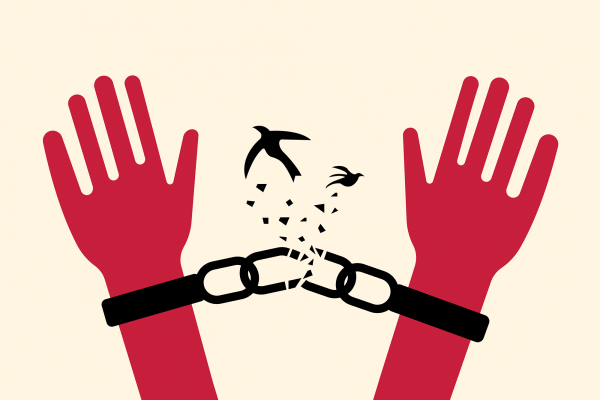I HAD A conversation recently about an essay I’d written on prison labor in the United States. My colleague was shocked. Well into the 21st century, she mused, isn’t that a phenomenon reserved for totalitarian regimes on the other side of the planet?
It’s a reasonable assumption. After all, it sounds an awful lot like slavery.
The U.S. never abolished enslavement; we only regulated it. In 1865, the 13th Amendment to the Constitution ended legalized chattel slavery and involuntary servitude, except “as a punishment for crime whereof the party shall have been duly convicted.” This proviso, known as the “exceptions clause,” has served to obscure the continuation of an American slave system from the end of the Civil War to the present day.
Convict-leasing schemes were integral to rebuilding the South from the ashes of total war. Incarcerated labor fueled the postwar Industrial Revolution. And today, approximately 800,000 of the country’s nearly two million incarcerated people work for a pittance (on average, less than a dollar an hour) with varying degrees of willingness. If U.S. prisons and jails were to form that workforce into a conglomerate, they would be the nation’s third largest private employer, behind only Walmart and Amazon.
Prison is an American waste bin. It is where we throw the “problem” populations we cannot — or do not want — to incorporate. In our history, newly emancipated Black people, hoards of working-class white men whose economic lives were turned upside down by industrialization, people experiencing addiction and mental illness — all of these and others have been the objects of moral panic to justify their disposal. So, it’s not surprising that prison labor rarely makes the news.
It’s a short step from naming a “problem” population to criminalization and providing the “solution” of a prison cell. But working-class people, Christians especially, would do well to reject the premise that there are throwaway people. The inability of outside-the-prison workers to identify inside-the-prison workers as equal in dignity is not only immoral, but also self-defeating.
Capitalism forces workers to sell their labor, time, and therefore their lives in the marketplace to secure a wage. (I sold several hours of my life to Sojourners to write this essay. Thanks for reading!) Our labor is a commodity. As such, it’s subject to the basic rules of supply and demand. When unemployment is high, wages decrease because there are more workers than work. When unemployment is low, such as the U.S. is experiencing now, wages increase because fewer workers are available to do what employers want done. However, employers hack this system by flooding the labor pool with below-market-rate “product” or workers to artificially suppress wages and increase their profits.
But who will work for less than the market-rate wage? This is where especially vulnerable populations come in — children, poor migrants, and incarcerated people. This dynamic explains why, since 2021, 14 states have enacted legislation to weaken child labor laws; wage theft from immigrants continues to rise; and, earlier this year, The Associated Press found that hundreds of major food brands — such as McDonalds, Kroger, and Aldi — used prison labor (labor that is often involuntary) in their supply chains.
Some might argue, with an air of superiority, “Well, those people need to pay their debt to society.” But it comes out of our pockets in the form of lower wages and opportunities lost to artificially cheaper options. Workers in state-owned correctional facilities produced $2.1 billion in goods and services in 2021 but earned between 30 cents to $1.30 per hour according to the American Civil Liberties Union. Corporations benefit financially from using state-controlled labor, not subject to labor laws or market pressure. Employers have no reason to pay outside workers a living wage when they can pay inside workers next to nothing. It’s the new convict-leasing scheme.
When the dignity of any working person is undermined, all are implicated. In 2015, the Free Alabama Movement, an organization of incarcerated workers in the South, proposed the Alabama Freedom Bill to the state legislature. The bill demands that anyone who works in Alabama not be paid below minimum wage, “including those citizens incarcerated in the ADOC, and that no restrictions on forming a labor union shall apply to any person performing labor within or for the Alabama Department of Corrections.” That’s a great place to start.
Supremacist systems are our ailment, and solidarity is the antidote. Solidarity enables us to see that when we throw away whole populations, we discard something of ourselves, as well.

Got something to say about what you're reading? We value your feedback!







